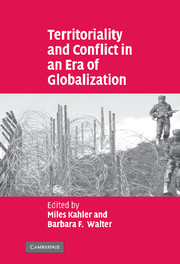Book contents
- Frontmatter
- Contents
- List of figures
- List of tables
- List of contributors
- Acknowledgments
- 1 Territoriality and conflict in an era of globalization
- Part I Territorial attachment and detachment
- Part II Territorial stakes and violent conflict
- Part III Territorial regimes in an era of globalization
- Conclusion
- References
- Index
1 - Territoriality and conflict in an era of globalization
Published online by Cambridge University Press: 22 September 2009
- Frontmatter
- Contents
- List of figures
- List of tables
- List of contributors
- Acknowledgments
- 1 Territoriality and conflict in an era of globalization
- Part I Territorial attachment and detachment
- Part II Territorial stakes and violent conflict
- Part III Territorial regimes in an era of globalization
- Conclusion
- References
- Index
Summary
The world of the early twenty-first century displays both persistent attachments to territory and violent conflict over those territorial stakes. Even as interstate conflict has declined, many costly internal conflicts have taken on a territorial dimension. The persistence of territoriality and the conflict that it inspires run counter to one popular view of the consequences of growing globalization: capital, goods, and populations display increased mobility, and their detachment from territory should reduce the importance of conventional territorial boundaries. Globalization has produced changes in territoriality and the functions of borders, but it has eliminated neither. We do not live in a “borderless world” or one that has seen the “end of geography” (Ohmae 1990; O'Brien 1992). Conflict over territory continues in an increasingly integrated world.
Spanning the social sciences, the authors in this volume present converging investigations into the complex causal relations among territoriality, conflict, and globalization. The study of globalization and the persistence of ethnic conflict have stimulated an interest in borders of all kinds, questioning their permanence and defining the consequences when social and cultural identities do not coincide with political boundaries and territorial claims. The contributors display skepticism toward both an unreconstructed view of the sovereign territorial state and the competing claim that globalization has completely transformed the existing territorial regime. The modern territorial state is seen as one historically bounded exemplar of territoriality, rather than the defining expression of territorial rule.
- Type
- Chapter
- Information
- Publisher: Cambridge University PressPrint publication year: 2006
- 17
- Cited by



